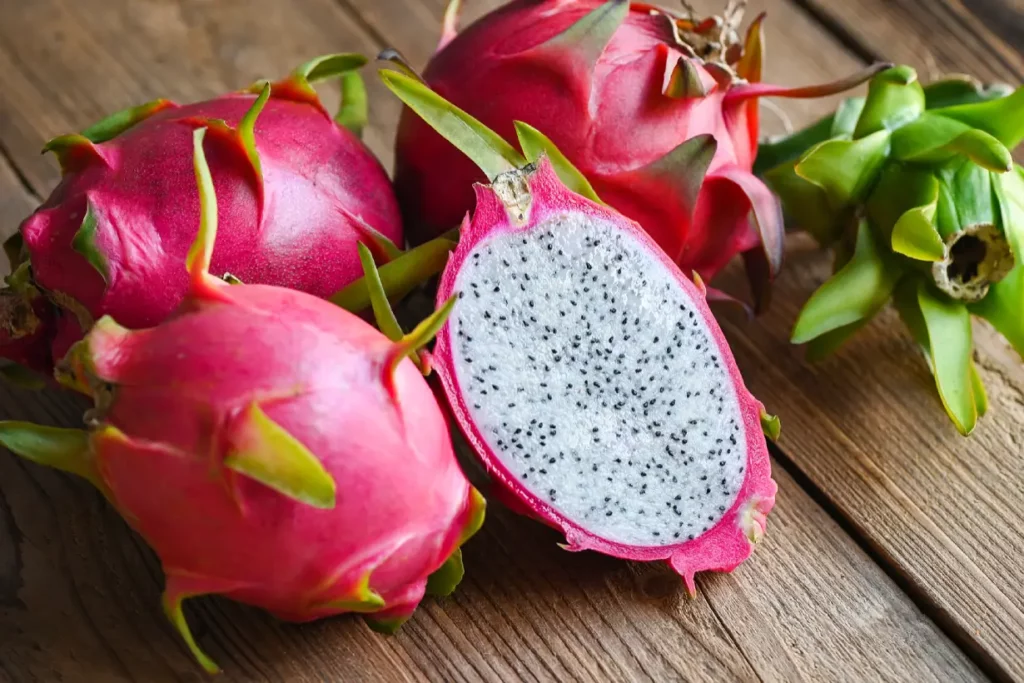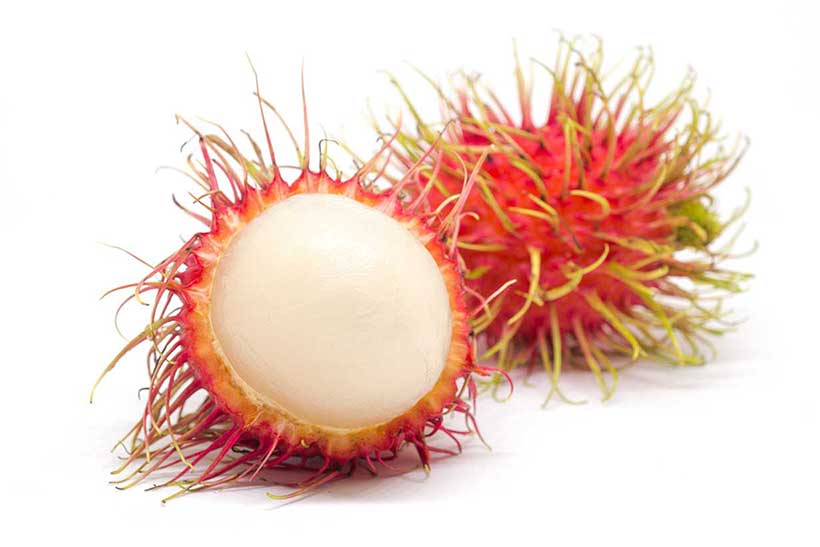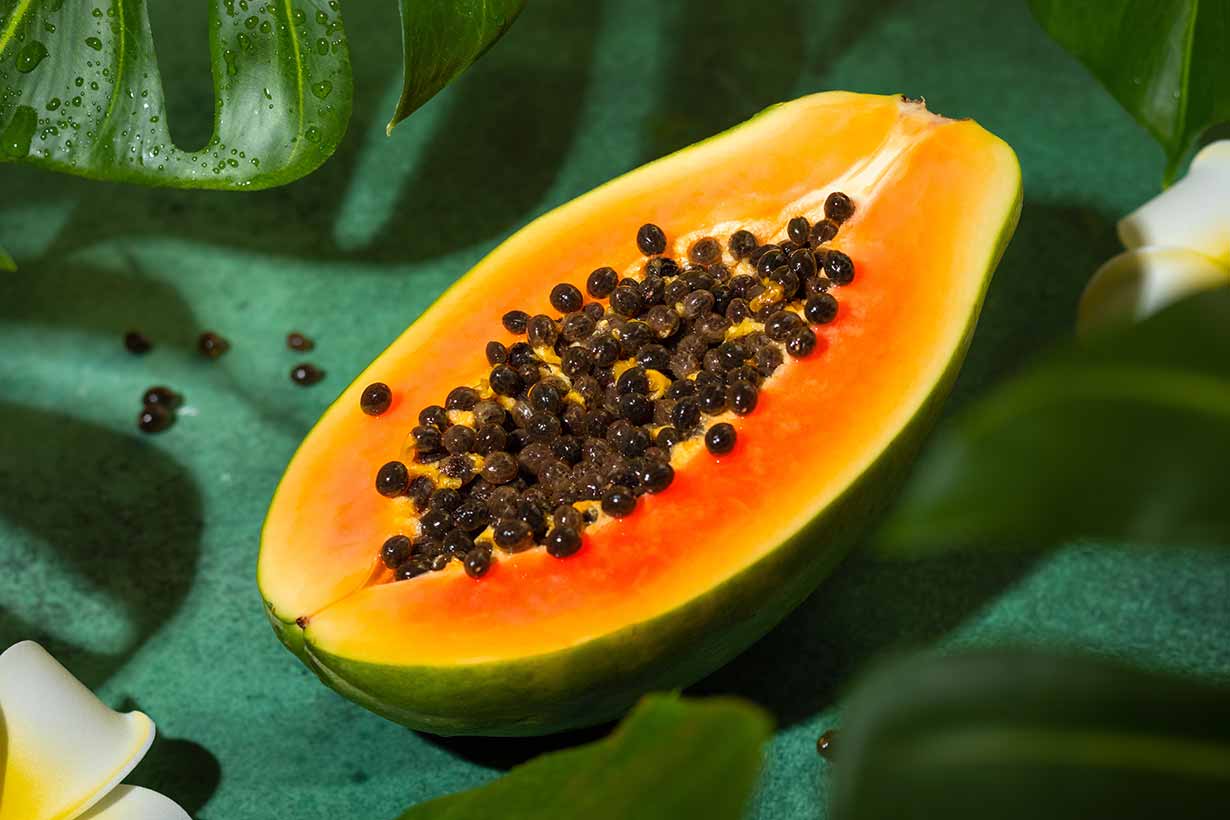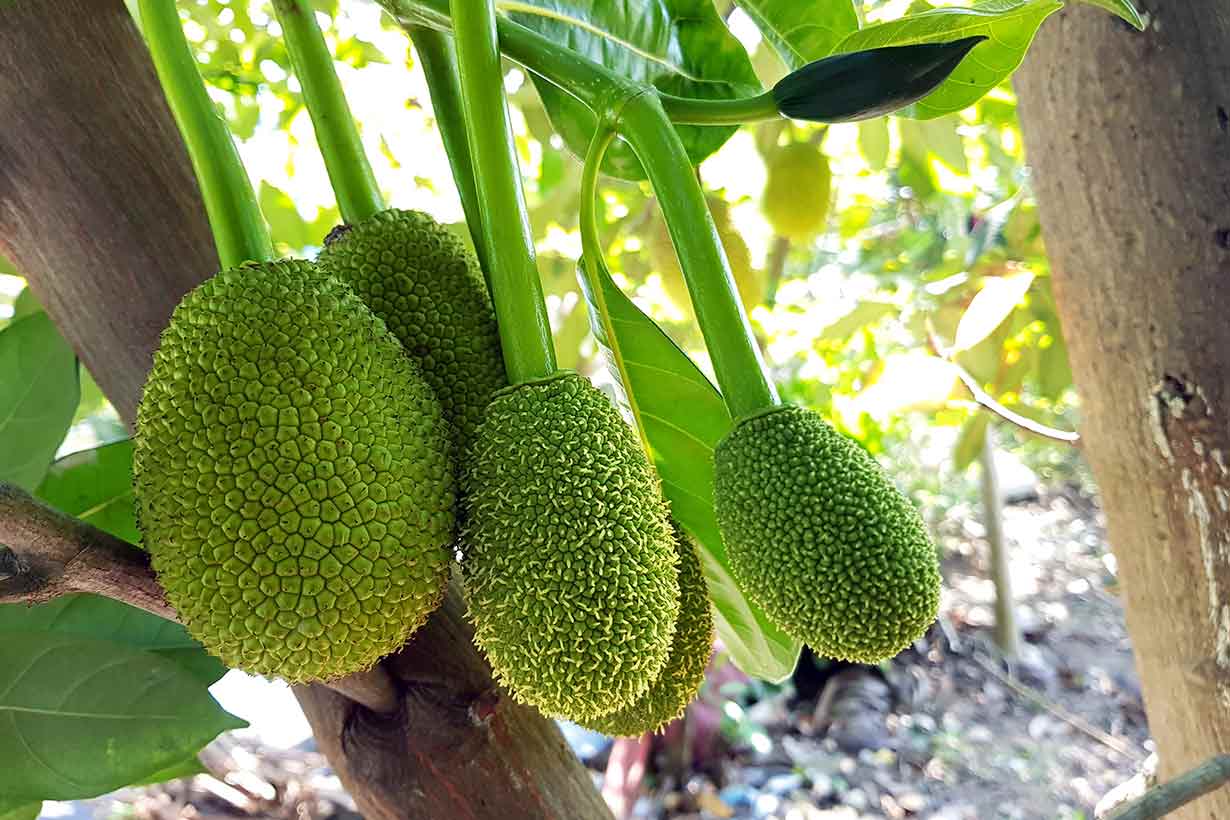Dragon fruit, also known as pitaya, has been growing in popularity over recent years. Its bright pink skin and seed-filled creamy flesh lend it an exotic appearance.
But while dragon fruit may look pretty, does it offer good nutritional value?
In this article, we’ll find out by exploring its complete nutritional values and reviewing the scientific research on its potential health benefits.
Key Nutrients
Key nutrients in an 180-gram cup of dragon fruit:
- Calories: 122 kcal
- Carbohydrates: 29.2 g
- Fiber: 3.24 g
- Sugars: 21.6 g
- Fat: 0.38 g
- Protein: 1.22 g
- Vitamin C: 35.6 mg (40% DV)
- Copper: 0.11 mg (12% DV)
- Phytonutrients: Betalains, carotenoids, flavonoids, phenolic acids
Percent daily values (% DV) are based on a 2,000 calorie diet
Table of contents
5 Potential Health Benefits of Dragon Fruit

Let’s first explore some potential benefits of dragon fruit, stemming from both its nutrient provision and findings from scientific studies.
1. May Promote Gut and Immune Health
A randomized, controlled trial published in the journal Food Research International investigated the impact of dragon fruit oligosaccharides on the gut microbiota (1).
Oligosaccharides are prebiotic carbohydrates that escape digestion and travel to the bowel, where they are digested by gut microbes. These beneficial gut bacteria are collectively known as the microbiota, and prebiotic foods help promote their growth (2).
In the study—which featured 107 healthy adults—participants consumed either 4g or 8g of dragon fruit oligosaccharides (DFO) per day, or a placebo, for four weeks.
Compared to placebo, the group consuming 4g of DFO experienced a 10.95% increase in immunoglobulin A (IgA) levels (1). IgA is an antibody produced by the immune system that helps to fight bacterial infections (3). In this sense, it also helps to keep a beneficial balance of bacteria in the gut.
Notably, the group consuming 8 grams of DFO per day saw an increased presence of beneficial gut bacteria and decreased levels of harmful bacteria (1).
According to a large review of systematic reviews, a healthy gut microbiome is associated with (4):
- Better immune health
- Increased antioxidant capacity
- Lower fasting blood glucose levels
- Lower risk of diarrhea and better gastrointestinal function
- Reduced infant mortality
Key point: The prebiotic carbohydrate—oligosaccharides—in dragon fruit may improve gut health, which can have various benefits for overall health.
2. It’s Full of Vitamin C
Dragon fruit contains a high amount of vitamin C, an essential vitamin with antioxidant and immune-enhancing functions (5).
It is important to keep a sufficient level of vitamin C because it helps to protect us against oxidative stress, which can damage our cells. This oxidative stress may be caused through exposure to environmental pollutants, smoking, and even general metabolism (6).
Dragon fruit contributes 35.6 mg of vitamin C per 180-gram cup serving, which equals 40% of the recommended daily value set by the FDA (7, 8).
Vitamin C being the primary essential nutrient is a trait that dragon fruit shares with other tropical fruits like longan and rambutan.
Key point: A cup of dragon fruit provides nearly half of the daily value for vitamin C.
3. May Help Lower Blood Sugar Levels
While carbohydrates typically raise blood sugar levels—at least following a meal—not all carbohydrates have the same effect. Some carbohydrate-based foods can help lower fasting blood sugar levels compared to others (9, 10).
In this context, researchers have investigated dragon fruit’s impact on blood glucose levels. A systematic review published in 2017 assessed four randomized, controlled trials involving 109 participants with type 2 diabetes and 36 with prediabetes (11).
This review found that dragon fruit had no statistically significant effect on fasting blood glucose in individuals with type 2 diabetes. However, in individuals with prediabetes, dragon fruit intake led to a significant decrease in fasting blood glucose levels (11).
The researchers note that this is limited evidence, and that further, larger trials are required to better establish the effects of dragon fruit.
A further randomized, controlled trial published in 2025 fed participants at risk of type 2 diabetes a daily dragon fruit drink for four weeks (12). This drink contained 217g of frozen dragon fruit.
Over four weeks, participants consuming the daily dragon fruit drink saw their blood pressure drop, markers of inflammation like CRP (C-reactive protein) fall, and smaller insulin spikes after meals, signifying greater insulin sensitivity (12).
The researchers noted that while the findings show promise for dragon fruit decreasing the risk of type 2 diabetes, further research is warranted.
Key point: Dragon fruit may help people at risk of type 2 diabetes to manage blood sugar better.
4. Contains Betalains and Other Bioactive Compounds
Dragon fruit contains a range of bioactive compounds—often referred to as phytonutrients—including betalains, carotenoids, flavonoids, and phenolic acids (13, 14).
Several of these compounds have been shown to have antioxidant, anti-diabetic, anti-inflammatory, and anti-obesity properties in cell and rodent studies when prepared as dragon fruit extracts (15, 16, 17, 18, 19).
Looking at these types of studies allows us to consider the potential mechanisms behind dragon fruit’s beneficial effects.
However, as always, we should be careful not to overemphasize findings from such studies—what happens in rodents and cells may not be the same as in the human body. Furthermore, concentrated bioactive extracts from dragon fruit are different from consuming the whole fruit.
Key point: Dragon fruit contains several compounds—including carotenoids, flavonoid polyphenols, and betalains—that have beneficial health properties.
5. May Have Benefits for Heart Health
Several studies have investigated the potential for dragon fruit to have benefits for heart health.
A systematic review of animal and human studies identified nine animal and seven human studies on this topic (20).
The review found mixed evidence for betalain-rich cacti (dragon fruit and cactus pear) having blood-pressure-lowering benefits, based on small sample sizes and inconsistent results.
However, there was more supportive evidence for the fruit improving vascular and endothelial function in human trials (20).
Vascular and endothelial function refers to the flexibility of blood vessels and how well they control blood flow (21).
The review concluded that while human trials support dragon fruit improving heart rate variability, further, larger trials are necessary to confirm the results. The authors noted that study participants were generally young, so studies with older populations are necessary to confirm if the same effects occur, since organ function changes with age.
Key point: Human trials appear to show dragon fruit having benefits for heart rate variability.
Does Dragon Fruit Have Any Downsides?
Dragon fruit is generally a healthy fruit choice, but there have been documented cases of allergic reactions.
While these appear to be very rare, two case studies have been published on the topic.
In one case study, a young woman experienced an allergic reaction to a mixed fruit drink that contained dragon fruit (22).
In another case study, a 19-year-old woman needed emergency medical treatment after an allergic reaction to a fruit salad containing dragon fruit. She subsequently tested positive for dragon fruit allergy (23).
Aside from allergies, another factor to consider is the relative expense of dragon fruit.
Since it’s an “exotic” fruit typically imported from Southeast Asia, it is typically more expensive than locally grown fruits.
Key point: Other than rare potential allergies and its premium price, there are no real drawbacks of dragon fruit to worry about.
The Nutritional Profile of Dragon Fruit
For your reference, here are the full nutritional values for dragon fruit according to USDA data (7).
As the weight of the fruit can vary, the nutritional data is presented per 100 g.
Calories and Macronutrients
- Calories: 68 kcal
- Carbohydrates: 16.24 g
- Fiber: 1.8 g
- Sugars: 12.0 g
- Fat: 0.21 g
- Saturated fat: 0.05 g
- Monounsaturated fat: 0.02 g
- Polyunsaturated fat: 0.05 g
- Protein: 0.68 g
- Cholesterol: 0 mg
- Water content: 82% by weight
Dragon fruit contains 68 calories per 100 grams and is primarily a source of carbohydrates, with low amounts of fat and protein.
Vitamins
- Vitamin C: 19.8 mg (22% of the daily value (DV))
- Vitamin B6: 0.10 mg (6% DV)
- Thiamin (B1): 0.05 mg (4% DV)
- Folate, DFE: 11 mcg (3% DV)
- Vitamin K: 3.8 mcg (3% DV)
- Riboflavin (B2): 0.03 mg (2% DV)
- Niacin (B3): 0.36 mg (2% DV)
- Choline: 6.8 mg (1% DV)
- Vitamin E: 0.18 mg (1% DV)
- Vitamin A, RAE: 5 mcg (<1% DV)
- Vitamin D: 0 mcg (0% DV)
- Vitamin B12: 0 mcg (0% DV)
Dragon fruit is high in vitamin C and contains several other essential vitamins in small to moderate quantities.
Minerals
- Copper: 0.06 mg (7% DV)
- Potassium: 206 mg (4% DV)
- Magnesium: 14 mg (3% DV)
- Iron: 0.12 mg (2% DV)
- Calcium: 13 mg (1% DV)
- Phosphorus: 18 mg (1% DV)
- Sodium: 1 mg (<1% DV)
- Zinc: 0.09 mg (<1% DV)
- Selenium: 0.2 mcg (<1% DV)
Copper is the mineral present in the highest amounts in dragon fruit.
Aside from this, it offers some magnesium and potassium, and smaller amounts of other minerals.
Red-Flesh and Yellow Varieties of Dragon Fruit
Red dragon fruit with white flesh, known scientifically as Hylocereus undatus, is the most commonly available dragon fruit variety.
However, there are several different—but less common—varieties of the fruit. These include red-fleshed dragon fruit (Hylocereus costaricensis) and yellow dragon fruit with white flesh (Selenicereus megalanthus) (13).
According to a nutritional analysis of red and white-fleshed dragon fruit, the two are fairly similar overall. However, red-fleshed dragon fruit contained slightly higher levels of total sugar and total phenolic compounds, but the difference was small (24).
Yellow dragon fruit is the rarest variety of the fruit, and there is relatively little research on its properties (25).
Summary
Dragon fruit has an attractive appearance and an enjoyable taste.
As well as being a good source of vitamin C, research suggests dragon fruit may have some potential health benefits for the gut, heart, and glycemic control. However, most of the research is from small studies, and further, high-quality studies are necessary to confirm these effects in larger populations.
On the downside, its tag as an exotic fruit means that it may be a little more expensive than locally grown fruits.
For more nutritional information on fruit, see this guide to 54 common fruits.









